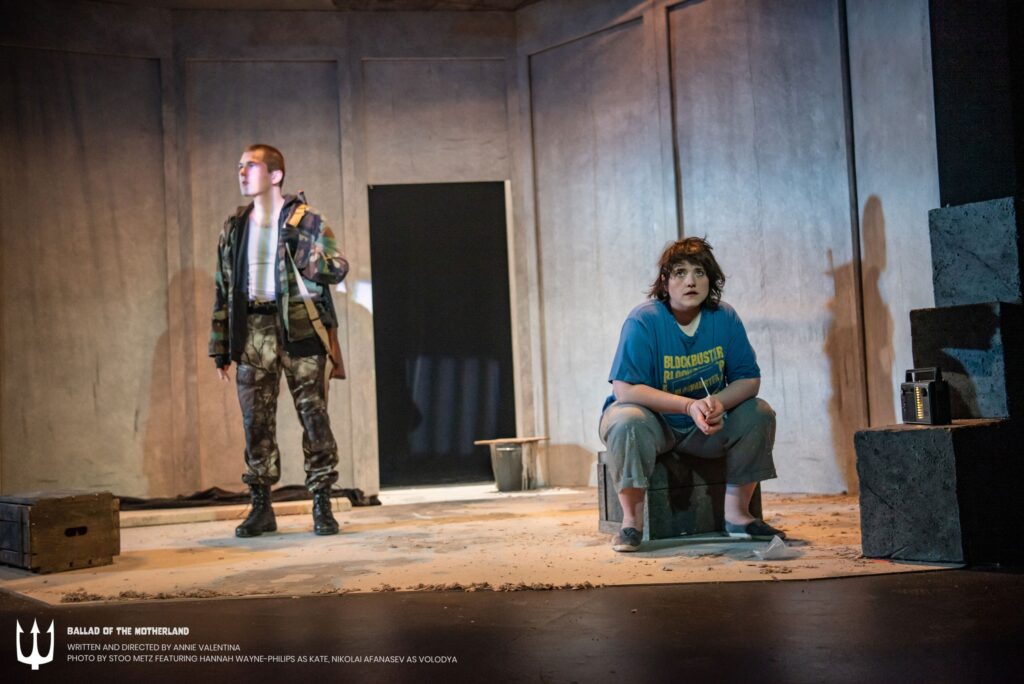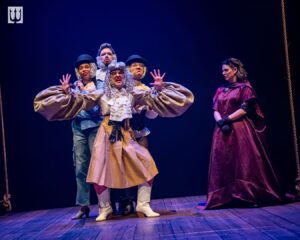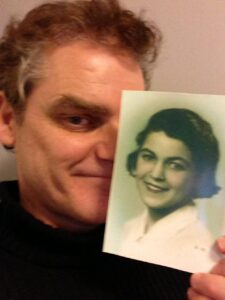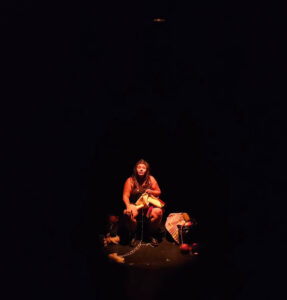
Nikolai Afanasev and Hannah Wayne-Phillips in Annie Valentina’s Ballad of the Motherland at Neptune Theatre. Photo by Stoo Metz.
I feel lucky to have seen Annie Valentina’s new play Ballad of the Motherland at Neptune Theatre and Jivesh Parasram’s Take D Milk, Nah at Eastern Front Theatre back to back this week, as they are both exploring themes of identity in relation to human-constructed borders, and the very real impacts that these made-up spaces, or nations, have on the histories of communities, families, and individuals. One speaks to a Indo-Carribean-Canadian experience, and one to a Russo-Ukrainian-Canadian experience, but the similarity in theme between the two plays is very interesting and deeply human. In this review I’ll focus first on Ballad of the Motherland, which plays just until April 2nd, 2023 at Neptune Theatre’s Fountain Hall. Take D Milk, Nah, opens at Festival Antigonish tonight, and then heads to the Highland Arts Theatre, and then on to Theatre New Brunswick, once it’s written and posted.
Ballad of the Motherland takes us to the Donbas Region of Ukraine in 2014 with the benefit of 2023 hindsight. It tells the story of Kate, a Queer Nova Scotian blogger who gets a paid internship (!) with a mostly non-political international magazine in Kyiv. In her naivety Kate decides to take an excursion to the Donbas region to connect with her paternal ancestry, and she finds herself in the middle of an armed conflict between the Ukrainian government and a militia of pro-Russian separatists. Kate is captured by the separatist militia and held under suspicion of being a Western Spy. This was obviously not the immersion into the history and the culture of her ancestors that she was expecting or prepared for.
The play too works with the benefit of hindsight, as it is a Memory Play, with Kate piecing together the memories of her time in captivity being held by an emotionally unsteady young soldier named Volodya, during a series of interviews with reporters in the present day. It is the first time she has spoken publicly about the ordeal, and we see both how she constructs the narrative for public consumption, and also we know how slippery memories are, even traumatic ones, so we are aware the story we are seeing is not necessarily the objective truth. Kate is honest with the reporter about the fact that she may be putting the puzzle pieces together in the wrong order, and we see this especially in the vague sense of time passing.
“People don’t like nuance, especially in war,” is the quote from the play that screamed out at me the loudest, and with the most weight and resonance. Volodya is a very young recruit to the Russian cause. On the surface he is a misogynistic homophobic asshole thug who is familiar regardless of his nationality or his cause. He is defensively brimming with toxic masculinity, he is proudly uneducated, he hurts people because he can. It’s easy, I think, for a lot of us now in 2023 to see a self-proclaimed Russian “soldier” in a play this way, from the safety of our theatre in Halifax, as just a stupid asshole. But of course it’s more nuanced than that. Volodya is sixteen years old and he feels that he has nothing to live for. For years he has felt powerless and exploited living in rural poverty witnessing urban corruption, and all his rage and pride is now being harnessed and used by different politicians for their own agenda: one that is likely to leave him dead as well. A tragic backstory doesn’t absolve people from the horrific things they have done and the awful choices they have made, but the nuance does matter. We see that vividly in Kate, who tries every day she is incarcerated to connect somehow to her captor.
The relationship that the actors, Hannah Wayne-Phillips as Kate, and Nikolai Afanasev as Volodya, develop in front of us on stage is very masterful. It does not evolve in an arc, it oscillates in dramatic fits and starts between intimacy and the threat of sudden death. The stakes are always high, even when the barriers between them begin to come down. Kate is always one wrong word away from being violently punished. As a director Annie Valentina helps to create this push and pull of tension, with all the layers of gender, nationality, age, education, sexual orientation, physical strength, power, and will to live to name a few, interwoven into the subtext. Both performances are very strong, but Afanasev is doing especially seamless work holding all these contradictions within a character that the audience simultaneously despises but also likely cares about: someone who evokes both disgust and empathy, and who stands for both an idea of a type of person, and who also becomes an individual.
Jess Lewis’ lighting design, and Jordan Palmer’s projection and sound design are extremely effective in immersing us in Kate and Volodya’s world in a prison in the Donbas in 2014, and then also pulling us back into our current reality with the War in Ukraine as our own horrifying backdrop, one that is becoming, unfortunately, more and more normalized here in Canada, as it goes on. There is also amazing special effect makeup in this play, some of the best I have ever seen, which also adds to the dynamic realism the piece evokes.
This play immerses its land acknowledgement into the world of the play, which links our understanding of Turtle Island, and Mi’kma’ki with this other story about a conflict over land ownership in a different place. I think most of us are aware that the official borders that we recognize between Canada and the United States, between Nova Scotia and New Brunswick, and Prince Edward Island for example, do not correlate to the lands of the Mi’kmaq. Conversely, in Ukraine now, most of us are supporting a very clear, a very distinct and defended border between Russia and Ukraine. I’m aware that my relationship with borders, and Nationalism too, right now is contextual. But what about the people who do legitimately live in the Donbas, the people in between those two countries, those two identities, those two worlds? What about people like Kate who are both Russian and both Ukrainian in ancestry? During the pandemic we doubled down on our borders in a way that, it can be argued, saved lives. The Internet doesn’t like nuance either.
It’s more comfortable, I think, to see Volodya too as being specifically Russian, but of course he is familiar to us because enraged, largely poor and uneducated, homophobic, transphobic, misogynic, toxic masculinity nationalistic bullies exist almost everywhere, and they’re becoming way more visible. I find that it is easier to empathize with them when they are a character in a play; but empathy and nuance are really what we need to hold onto so much right now. Thank you to Annie for reminding me.
Ballad of the Motherland plays tonight through Sunday (April 2) at 7:30pm at Neptune Theatre’s Fountain Hall Stage (1593 Argyle Street, Halifax) with matinees on Saturday and Sunday at 2:00pm. Tickets rage in price from $33.00-$68.00 and are available here. Neptune Theatre is fully accessible for wheelchair users. For more Accessibility Information click here.






